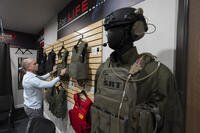Teachers have a responsibility to prepare young people for their professional future. Military service is an opportunity to most students and can provide enriching experiences on the way to another career or through a lifetime of service to one's country.
These questions help teachers give honest answers to students interested in a military career or guidance to students whom teachers think may excel in the armed forces.
How Does the Military Compare with the Private Sector?
The military offers stable but challenging careers with regular promotions and often accelerated responsibility. It provides training in more than 4,100 specialties, many of which have civilian counterparts. The armed forces also provide leadership experience and training that help people excel if they leave the military following their commitment. Other benefits that make the military a good option include early retirement programs, health and dental care, 30 days of paid vacation annually, veterans benefits, competitive pay and myriad ways to earn money for college and training.
Will My Student Qualify for a Civilian Job After Getting Out?
The armed forces offer more than 4,100 careers, most of which have direct counterparts in the private sector. Additionally, service in the military builds leadership skills and personal responsibility traits that many employers desire.
Will My Student Receive Money for College?
Yes, if your student enlists and completes his or her term of service, he or she will qualify for a number of educational benefits, including the Montgomery GI Bill. Benefits vary by service. For more on the GI Bill, see the GI Bill overview.
What is the Difference Between Enlisting and Commissioning?
Enlisting and commissioning (becoming an officer) offer different career paths. Not all jobs are available in both career paths, so you should help your students make sure that their interests and abilities are reflected in their choices. Becoming an officer is generally available only to college graduates commissioned through ROTC, one of the service academies or another commissioning program.
What Military Provisions Ensure My Student Will Not Be Sexually Harassed?
The Defense Department has stringent policies against harassment of any kind. Training is conducted in well-supervised and generally safe environments. Click here for more on DoD sexual harassment policies.
How Much Pay Will My Student Receive?
Your student may decide to go active duty, reserve or guard. For more on pay scales and other aspects of military pay, click here.
How Long Does My Student Have to Commit?
This depends on what service your student chooses, what career field they pick and the training they accept. Some enlistment terms are as short as two years.
What About Medical Benefits?
Military members and their families receive outpatient care at military hospitals and clinics at no charge. There is a nominal charge for in-patient care of family members. For families not located near military health facilities, the military medical insurance program (TRICARE) pays 80% to 100% of the costs at civilian hospitals and clinics. Dental care is free to service members, with a minimal cost for family members.
How Much Vacation Time is Granted?
Your student will get 30 days of vacation with pay each year, as well as government holidays.
What is the Minimum Age for Enlistment?
Your student must be at least 17 years old to enlist with parental consent. Without it, your student must be 18.
Is My Student Guaranteed to Do the Job They Want Before Enlisting?
In most cases, the military offers qualified applicants guaranteed training assignments. However, the availability of this program varies, based on service need.
What if My Student Wants Out?
Your student's commitment to the military is based on a contract, which means he or she is bound legally to serve the term. There are exceptions. If a student is found to be grossly incompatible with military service, he or she may receive an administrative discharge for the convenience of the service.
What Training Will They Receive?
The training that your student receives depends on their chosen service and career path. Training will include both job-specific proficiency and general military training, such as team building and leadership.
How Can I Help?
Be sure that you help your students think through the process completely. You may want to help students find ways to prepare for the ASVAB (a standardized test used to determine applicants' talents) and to evaluate their choice. Visit Military.com's ASVAB section for more details and a practice test.
Interested in Joining the Military?
We can put you in touch with recruiters from the different military branches. Learn about the benefits of serving your country, paying for school, military career paths, and more: sign up now and hear from a recruiter near you.















